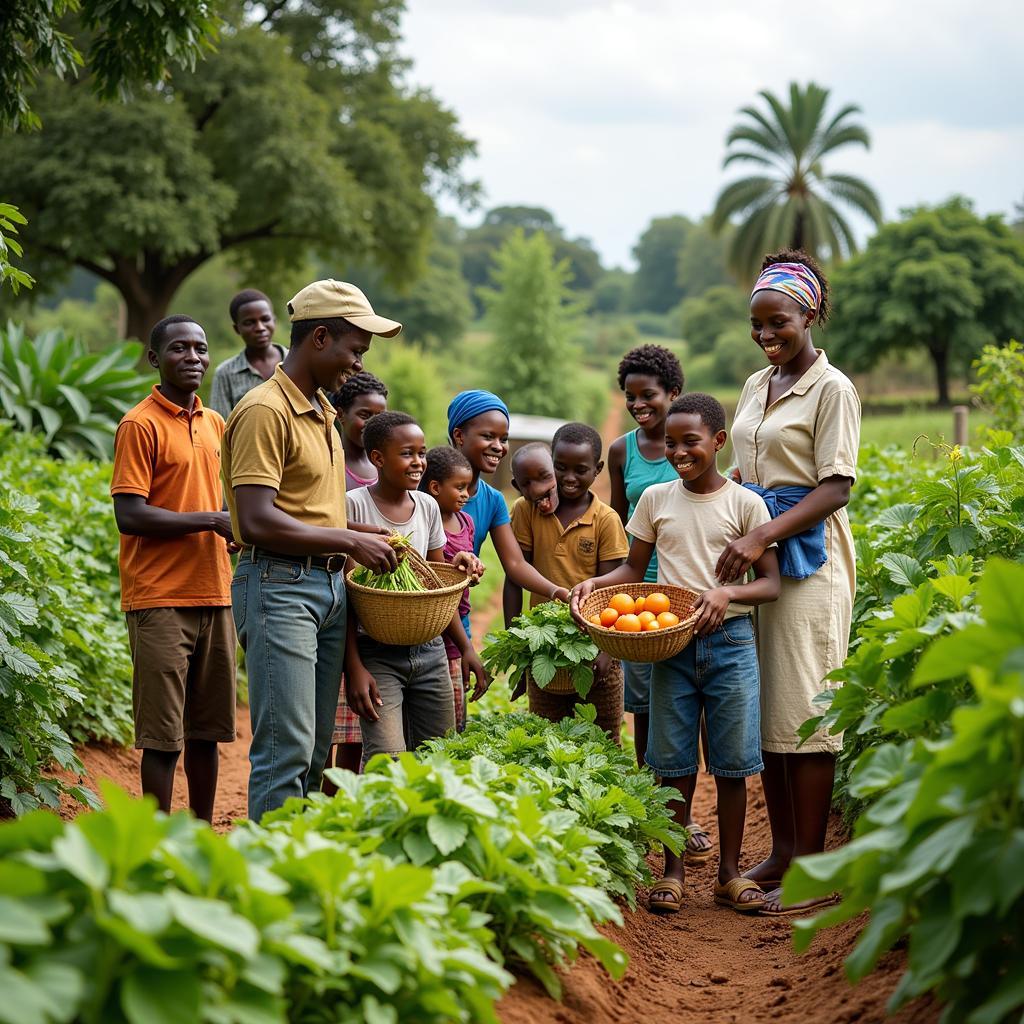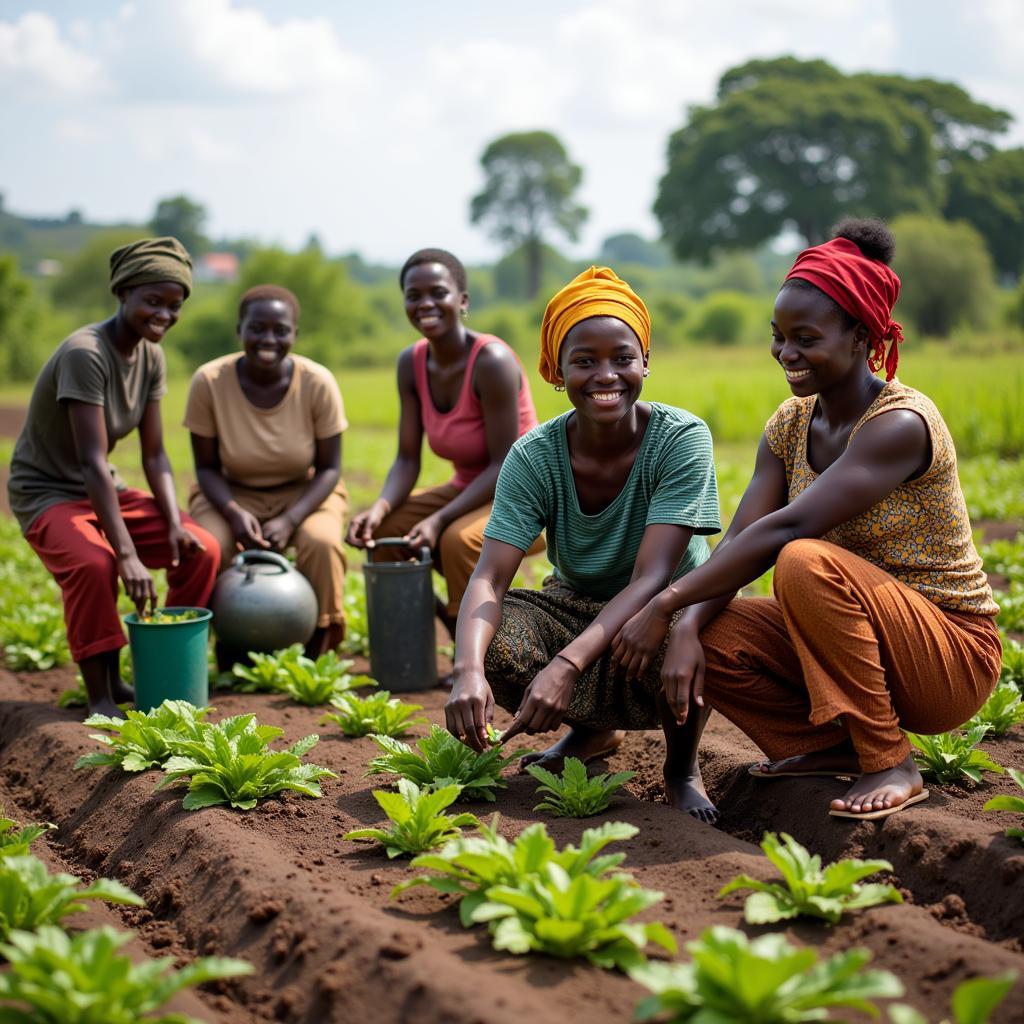Cultivating Community: The Power of the African Community Farm
From the fertile valleys of Ethiopia to the sun-drenched plains of Senegal, a quiet agricultural revolution is taking root: the rise of the African Community Farm. More than just shared plots of land, these farms are fostering a spirit of collective growth, tackling food security, and promoting sustainable practices across the continent.
 Celebrating the Harvest on an African Community Farm
Celebrating the Harvest on an African Community Farm
Sowing the Seeds of Unity: What Defines an African Community Farm?
Unlike traditional, family-owned farms, African community farms are built on the principle of shared ownership and responsibility. They can range in size and scope, from small vegetable gardens nestled within urban areas to larger-scale agricultural ventures in rural communities. The defining characteristic is the collective effort of the community members who come together to work the land, share resources, and reap the rewards.
More than Crops: The Multifaceted Benefits of Community Farming
The impact of African community farms extends far beyond the fields, nourishing not only bodies but also communities and the environment:
- Food Security: By cultivating a diverse range of crops, these farms enhance local food systems, ensuring greater access to fresh, nutritious food for community members, particularly in regions grappling with food shortages.
- Economic Empowerment: Community farms often operate as cooperatives, allowing farmers to pool resources, access markets, and generate income collectively, empowering individuals and strengthening local economies.
- Environmental Stewardship: Many African community farms are embracing sustainable and agroecological practices, promoting biodiversity, conserving water resources, and preserving the delicate balance of their ecosystems.
- Social Cohesion: The collaborative nature of community farms fosters a strong sense of unity and shared purpose, bridging cultural and generational divides, and strengthening the social fabric of communities.
 Women Leading the Way in African Community Farming
Women Leading the Way in African Community Farming
Reaping the Rewards: Examples of Success
Across Africa, community farms are flourishing, demonstrating the transformative potential of this approach:
- The Juhudi Women’s Group in Kenya: This inspiring group of women transformed a barren plot of land into a thriving farm, supplying their community with fresh produce and generating income through the sale of surplus crops.
- The Timbuktu Community Garden in Mali: Located in an arid region, this garden utilizes traditional water harvesting techniques and drought-resistant crops to provide food security and income-generating opportunities for its members.
Cultivating a Brighter Future
African community farms are more than just agricultural initiatives; they are powerful engines of social, economic, and environmental change. By fostering collaboration, empowering communities, and promoting sustainable practices, these farms are cultivating a brighter and more resilient future for Africa.
Frequently Asked Questions About African Community Farms
1. Who can join an African Community Farm?
Most African community farms are open to anyone in the local community who is willing to contribute their time and effort.
2. What types of crops are grown on African Community Farms?
The crops grown vary depending on the climate and region, but common crops include maize, beans, vegetables, fruits, and staple grains.
3. How do African community farms address climate change?
Many community farms are adopting climate-smart agricultural practices such as drought-resistant crops, water conservation techniques, and agroforestry to adapt to the challenges of a changing climate.
4. Are there any government programs supporting community farms in Africa?
Yes, several African governments and international organizations offer support programs, including access to training, resources, and funding, to promote the growth of community farms.
5. How can I support African community farms?
You can support these farms by donating to organizations working in this field, purchasing products from community farm cooperatives, or volunteering your time and skills.
For support in starting or scaling your African community farm, reach out to us. Call: +255768904061, Email: [email protected], or visit: Mbarali DC Mawindi, Kangaga, Tanzania. Our team is available 24/7.

